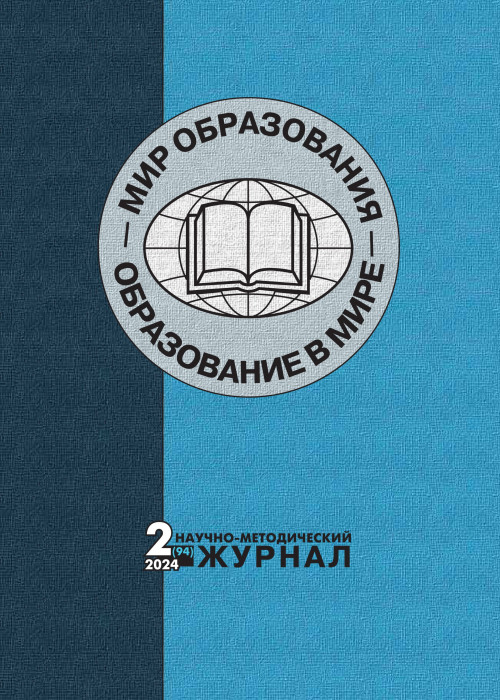Library
1. 9. ОДИ-1 // Организационно-деятельностные игры / сост. и отв. ред.: А. А. Пископпель, В. Р. Рокитянский, Л. П. Шедровицкий. — Москва : Наследие ММК, 2006. — 720 с.
2. 20. To adopt or reject? Testing the robustness of a principle-based scenario for guiding effective student questioning / H. J. M. Stokhof, Vries B. De, R. Martens, T. Bastiaens // Educational Design Research. — 2018. — Vol. 2. — Iss. 1. — Article 13.
3. 19. Scenario for guiding effective student questioning by means of (digital) mind mapping: a teachers manual / H. J. M. Stokhof, B. Vries De, R. Martens, T. Bastiaens. — Nijmegen, The Netherlands : HAN University, 2017.
4. 18. Questions, Stanford Encyclopedia of Philosophy. — URL: <a href="https://plato.stanford.edu/" target="_blank">https://plato.stanford.edu/</a> entries/questions (date of the application: 05.03.2024). — Teхt: electronic.
5. 17. National Academies of Sciences, Engineering, and Medicine. Call to Action for Science Education: Building Opportunity for the Future. — Washington, DC : The National Academies Press, 2021. — 76 p. — URL: <a href="https://doi.org/10.17226/26152" target="_blank">https://doi.org/10.17226/26152</a> (date of the app
6. 16. Fitch J. G. The Art of Questioning / J. G. Fitch. — New York : Baker, Pratt & Сo, 1879. — 94 p.
7. 15. Dillon J. T. The Practice of Questioning / J. T. Dillon. — London and New York : Routledge, 1990. — 287 p.
8. 14. Dillon J. T. Questioning and Teaching / J. T. Dillon. — А Manual of Practice, 2004. — 208 p.
9. 13. Asking questions: the effect of a brief intervention in community health centers on patient activation / D. Deen, W.-H. Lu, D. Rothstein et al. // Patient Education and Counseling. — 2011. — Vol. 84 (2). — P. 257–260.
10. Shchedrovitskii G. P. Mekhanizmy raboty seminarov MMK / G. P. Shchedrovitskii // Voprosy metodologii. — 1998. — № 1–2. [Takzhe stat’ya dostupna na saite Instituta razvitiya im. G. P. Shchedrovitskogo. URL: <a href="https://clck.ru/sRijT" target="_blank">https://clck.ru/sRijT</a> (data obrashcheniya: 04.03.
11. 12. Щедровицкий Г. П. Механизмы работы семинаров ММК / Г. П. Щедровицкий // Вопросы методологии. — 1998. — № 1–2. [Также статья доступна на сайте Института развития им. Г. П. Щедровицкого. URL: <a href="https://clck.ru/sRijT" target="_blank">https://clck.ru/sRijT</a> (дата обращения: 04.03.2023)]. — Текст:
12. Shchedrovitskii G. P. Organizatsionno-deyatel’nostnaya igra kak novaya forma organizatsii kollektivnoi mysledeyatel’nosti / G. P. Shchedrovitskii // Metody issledovaniya, diagnostiki i razvitiya mezhdunarodnykh trudovykh kollektivov: [sb. st.] / Mezhdunar
13. 11. Щедровицкий Г. П. Организационно-деятельностная игра как новая форма организации коллективной мыследеятельности / Г. П. Щедровицкий // Методы исследования, диагностики и развития международных трудовых коллективов: [сб. ст.] / Междунар. НИИ проблем уп
14. Shchedrovitskii G. P. Izbrannye trudy / G. P. Shchedrovitskii. — Moskva : Izd-vo shkoly kul’t. politiki, 1995. — XXXVII, 759 s.
15. 10. Щедровицкий Г. П. Избранные труды / Г. П. Щедровицкий. — Москва : Изд-во школы культ. политики, 1995. — XXXVII, 759 с.
16. ODI-1 // Organizatsionno-deyatel’nostnye igry / sost. i otv. red.: A. A. Piskoppel’, V. R. Rokityanskii, L. P. Shedrovitskii. — Moskva : Nasledie MMK, 2006. — 720 s.
17. 1. Георгий Петрович Щедровицкий / под ред. П. Г. Щедровицкого, В. Л. Даниловой. — Москва : РОССПЭН, 2010. — 598 с.
18. Maracha V. G. Moskovskii metodologicheskii kruzhok: osnovnye programmnye idei i formy organizatsii intellektual’nykh praktik (v dvukh chastyakh) / V. G. Maracha // Chast’ 1. Filosofskie nauki. 2004. — № 1. — S. 59–82; Chast’ 2. Filosofskie nauki. 2004. —
19. 8. Марача В. Г. Московский методологический кружок: основные программные идеи и формы организации интеллектуальных практик (в двух частях) / В. Г. Марача // Часть 1. Философские науки. 2004. — № 1. — С. 59–82; Часть 2. Философские науки. 2004. — № 2. — С.
20. Kollingvud R. Dzh. Ideya istorii. Avtobiografiya / R. Dzh. Kollingvud ; per. Yu. A. Aseeva. — Moskva : Nauka, 1980. — 488 s.
21. 7. Коллингвуд Р. Дж. Идея истории. Автобиография / Р. Дж. Коллингвуд ; пер. Ю. А. Асеева. — Москва : Наука, 19 80. — 488 с.
22. Karastelev V. Refleksivnaya kommunikatsiya kak uslovie dlya proyavleniya i razvitiya obrazovatel’noi agentnosti studentov magistratury / V. Karastelev, V. Danilova // Vektor nauki Tol’yattinskogo gosudarstvennogo universiteta. Seriya: Pedagogika, psikholo
23. 6. Карастелев В. Рефлексивная коммуникация как условие для проявления и развития образовательной агентности студентов магистратуры / В. Карастелев, В. Данилова // Вектор науки Тольяттинского государственного университета. Серия: Педагогика, психология. —
24. Karastelev V. Navigator voproshaniya / V. Karastelev. — [b. m.] : Izdatel’skie resheniya, 2023. — 192 s.
25. 5. Карастелев В. Навигатор вопрошания / В. Карастелев. — [б. м.] : Издательские решения, 2023. — 192 с.
26. Danilova V. L. Sub”ekt postupka v prostranstve organizatsionno-deyatel’nostnoi igry / V. L. Danilova // Chelovek.ru. — 2007. — № 3. — S. 105–127.
27. 4. Данилова В. Л. Субъект поступка в пространстве организационно-деятельностной игры / В. Л. Данилова // Человек.ru. — 2007. — № 3. — С. 105–127.
28. Danilova V. Interaktivnoe voproshanie: kak umenie stavit’ sobstvennye voprosy pomogaet razvivat’sya / V. Danilova, V. Karastelev, V. Rozin. — [b. m.] : Izdatel’skie resheniya, 2022. — 282 s.
29. 3. Данилова В. Интерактивное вопрошание: как умение ставить собственные вопросы помогает развиваться / В. Данилова, В. Карастелев, В. Розин. — [б. м.] : Издательские решения, 2022. — 282 с.
30. Danilova V. L. Kul’tura voproshaniya v nachal’noi shkole / V. L. Danilova, N. Yu. Efimova // Deyatel’nostnaya pedagogika i pedagogicheskoe obrazovanie : sb. tezisov VII Mezhdunar. konf. «DPPO-2019» (Voronezh, 6–10 sentyabrya 2019 g.). — Voronezh : Voronez
31. 2. Данилова В. Л. Культура вопрошания в начальной школе / В. Л. Данилова, Н. Ю. Ефимова // Деятельностная педагогика и педагогическое образование : сб. тезисов VII Междунар. конф. «ДППО-2019» (Воронеж, 6–10 сентября 2019 г.). — Воронеж : Воронежский инсти
32. Georgii Petrovich Shchedrovitskii / pod red. P. G. Shchedrovitskogo, V. L. Danilovoi. — Moskva : ROSSPEN, 2010. — 598 s.
